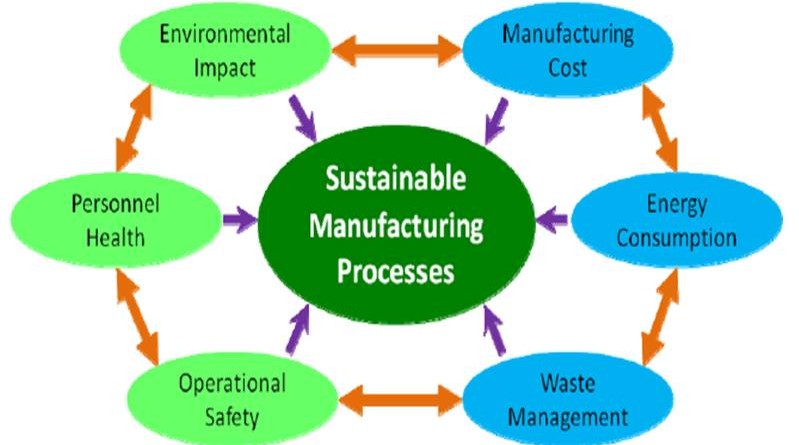How Sustainable Practices Are Changing the Manufacturing Sphere
For more than a decade, “sustainability PRACTICES” has been one of those vague buzzwords that has meandered in and out of the spotlight of our collective vocabulary. Some people look for the term when they shop online or browse the aisles of their grocery stores. Many brands have marketed environmentally-friendly products to consumers who value the sense of positively contributing to their ecosystems, of feeling like they are part of a solution.
It is true that sustainability, in any context, ultimately relates to human impact on the environment. For manufacturers, however, the term has a much more detailed definition:
“Sustainable manufacturing is the creation of manufactured products through economically-sound processes that minimize negative environmental impacts while conserving energy and natural resources. Sustainable manufacturing also enhances employee, community and product safety.”
In the industrial space, sustainability is primarily a business practice that considers the people who are making the products, in addition to the customers and the world they live in. Reducing harmful emissions can be both a direct goal and an indirect result of efficient manufacturing.
There are many types of sustainable industrial strategies that allow companies to save money, be environmentally responsible, remain competitive, and develop an attractive workplace culture. By examining every form of sustainability, manufacturers can fully understand the idea and decide how much they want to invest in the practice.
Efficient and Cost-Effective Manufacturing Processes That Reduce Waste
Because the Environmental Protection Agency [EPA] knows cost-effective manufacturing can ultimately diminish effects that are detrimental to local ecosystems, the organization has a history of rewarding efficient industrial businesses. In 2006 the agency acknowledged Canyon Creek Cabinet Company for “lean manufacturing.”
By reducing lead time and material waste, in one year the company saved roughly a million dollars and increased cabinet production from 900 per day to about 1,000. This accomplishment resulted in less hazardous byproducts and energy consumption.
Ryan Chan, founder of work order software company UpKeep, stated that companies can use sustainable practices to address at least seven sources of waste:
- Defects
- Motion
- Transportation
- Inventory
- Extra processing
- Waiting
- Overproduction
Recyclable And Sustainable Materials
Many companies incorporate sustainability into production itself, not only the efficiency of their processes. Athyron, for example, is a Texas-based manufacturer that uses recycled materials to produce Miura, an alternative to wood. The company’s sources include agricultural byproducts such as rice and peanut hulls, as well as plastic waste and nylon from recycled carpets.
Miura is not only a method of conserving trees and forests. The substance has advantages over wood, such as being immune to termites and rotting.
Sustainable manufacturing materials can also provide a competitive advantage in fields plagued with pollution problems. In the nanomaterial sector, a source for everything from dental implants to food packaging, there are regulations that restrict certain classes of chemicals because of their toxicity.
These policies paved a market penetration route for Boco Technologies, a company that produces sustainable nanomaterials from crustacean shells. Director Aaron Guan said this shift has improved customer perception of the industry.
Optimized Business Operations And Facilities
Every manufacturer utilizes at least one facility to create their products, participate in the supply chain process, and provide office space for employees. Because of basic necessities such as temperature control, lighting, gas, plumbing, water and electricity to power machines, simply running the business has an impact on the environment. Industrial companies can save money and resources by optimizing their operations.
For example, in 2009 a ThyssenKrupp elevators plant in Waupaca Wisconsin received a state environmental award for installing a system that recovered and recirculated heat that otherwise would have escaped and been wasted. This structure fueled heat during winter and supplied hot water to the facility, all at a lower cost.
Eco-Conscious Shipping Practices
The vast majority of shipping vehicles consume natural resources and emit exhaust. When they do not need to travel as far, the people involved in this aspect of the supply chain process usually save both time and money. There is less pollution and more fuel remaining for other trips.
Manufacturers can participate in sustainable shipping by collaborating with nearby suppliers and companies. This dynamic also contributes to local economies that are often in desperate need of stimulation.
Sustainable Packaging
Boxes are relatively easy to recycle, but not all packing materials have that quality. Manufacturers need to be mindful of how they are packaging parts and products. This attitude can be cost-effective and sustainable.
Southern Designs, a company that offers laser cutting — among other services — for industrial clients, invested in a corrugated packaging machine that produces boxes on demand with customizable sizes. This practice has reduced the need for void filling supplies such as paper, air pillows and bubble wrap, according to Founder Tance Hughes.
Fortunately Southern Designs is one of many businesses that has invested in sustainable packaging. Supplier demand for sustainable packaging recently spiked, according to a Thomas Index Report. Large enterprises such as Amazon and Coca-Cola have pledged to make 100% of their packaging sustainable in the coming decade.
Basic Recycling
This may seem like a simple and obvious issue, but lot of companies do not recycle properly. Only 34% of recyclable materials are processed sustainably, according to an EPA report. Manufacturers can help by to recycling as many materials as possible, and to do so in a way that is congruent with other aspects of sustainability.
Consumer Safety and Health
Perhaps the most important role manufacturers can play is ensuring their products and services are not dangerous or harmful to the health of consumers. To that end, manufacturers should be investing in excellent quality assurance. At least a few employees should be dedicated to this tenet, and every company should consider investing in an enterprise resource planning system [ERP] that will provide accountability. Manufacturers also need to adhere to laws and regulations regarding consumer safety and health.
This issue relates to the use of sustainable materials. There is an EPA-approved antimicrobial copper alloy, for example, that constantly fights bacteria.
Employee Safety and Health
Unfortunately, employers often overlook or neglect this crucial tenet. People who work on the floor in manufacturing plants and facilities are sometimes exposed to hazardous or dangerous situations. Companies have an obligation to care for their workers by meeting industry health standards.
This concern includes mental health as well. To foster a healthy environment, leaders and managers should treat their subordinates with respect and courtesy. Working hours and shift times should be reasonable as well, allowing employees to refresh and work at their best.
Every Facet of Manufacturing Sustainability is Connected
Adopting sustainable manufacturing practices can result in cost savings, efficiency improvements, and a better workplace. While the process may seem daunting, the payoff is definitely worth it.
Source Thomasnet




